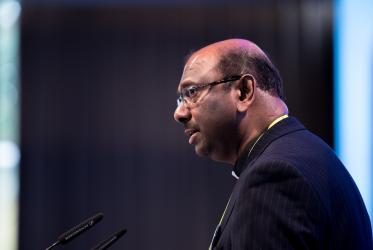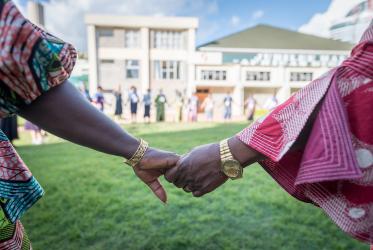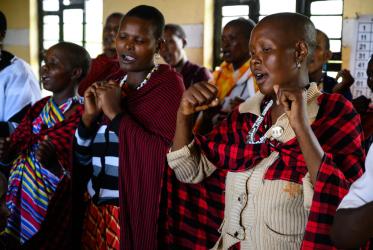In 2018 we celebrate the 70th anniversary of the World Council of Churches (WCC). In order to create a lively firsthand account of the ecumenical fellowship and of our shared journey, member churches have contributed stories of people, events, achievements and even failures, all of which have deepened our collective search for Christian unity.
This story was written by Marijke van Duin, who represented the Mennonite Church in the Netherlands at the 8th WCC Assembly in Harare, Zimbabwe, 1998. Since 2000 she has been a member of the WCC Working Group on Climate Change. Van Duin is a classical musician and chief editor at the Mennonite Church in the Netherlands.
Any views or opinions expressed in this article are those of the author, and do not necessarily reflect the policies of the WCC.
It’s a culture shock. Being in sub-Saharan Africa, attending a huge international conference. Both for the first time.
Harare, Zimbabwe, December 1998
Never have I seen such red earth, such downpours. There is a vague, undefined atmosphere of death everywhere. The assembly is impressive. The large hall is filled with people of all sizes and colours. Sometimes I vote blank because I don’t consider myself educated enough to do otherwise.
I make a friend, Edmore Rusangah. He works on campus as a handyman. Together we go to downtown Harare to rent a bicycle - after all I am Dutch. Riding a bike proves to be very practical on the large campus. People turn their heads and smile when I fly by.
Edmore is very thin and looks unhealthy. He has to get up at four o’clock every morning and catch a bus to be on time for work. There are rumours that the locals don’t get enough food. We participants start to collect the hotel food that we are being served on a daily basis. The well-filled plastic bags go to Edmore and to security staff in the buildings. My uneasy feeling won’t go away.
Edmore tells me about his past. One day, when he and his two younger sisters return from school – a 10 mile walk every day – they find the entire village murdered. Their parents, and everyone else. Rhodesian troops of Ian Smith have payed a visit. Edmore is 10 years old. He and his sisters are being placed in an orphanage. When he is older he wants to become an engineer. I am sure he can do so, he is intelligent. But he doesn’t have the necessary money. His monthly pay is $90.
Transformation
Interesting things happen at the assembly. My German Mennonite colleague Fernando Enns has prepared a proposal for a Decade to Overcome Violence. A buzz goes around. At the end of the second week the proposal gets adopted. Wow! The Decade will start in 2001.
Then the biggest happening of all: Nelson Mandela. The Big Man himself. I see him standing in a side room, a tall man in a colourful shirt. He smiles at me. I try to smile back, but feel too self-conscious. An hour later I will lose my smile altogether.
Mandela is on stage with a mic. He recites, we delegates have the text on paper. All people of colour are to stand upright and speak, all whites are to remain seated and listen. I sit still in my chair, most people around me are standing. They say with Mandela: “No more slavery, no more colonialism, no more apartheid”. I shrink and shrink, want to become invisible and sink below the floor. For the first time in my life I become aware that I am part of the oppressing white elite. What’s more, I am being perceived as such. In spite of the fact that my father, a theologian, is an anti-apartheid activist – I am still white and part of the elite. Then there is the horrible word itself: apartheid. It’s Dutch for God’s sake.
Is this how Germans feel decades after the Second World War?
Confrontation
The assembly is finished. I want to visit some interesting sites. Victoria Falls, of course. The tourist office shows me the possibilities. An average hotel costs around $100 per night. It’s more than Edmore’s monthly pay. I struggle and decide: I can’t do it. Instead, Edmore and I make up a contract. I give him all my money, and he signs an I-owe-you paper. He wants that. Deep down I know I will never see my money back. But I don’t care.
Amsterdam, the Netherlands, December 1998
It’s two days before Christmas. I am sitting on my couch like a zombie. The shops are bulging with stuff. Chocolate, presents, everything. I don’t understand it, don’t want it. The difference is too big. It is too much.
1999 – 2007
I send Edmore packages regularly. He writes me back and sends little hand made animals. An elephant, a lion, a scorpion from iron-wire. I give them to family and friends and they give me money for Edmore. Edmore also sends me pictures of his wife and two little daughters. They seem to do alright.
The situation in Zimbabwe starts to deteriorate. The economy goes down, Edmore loses his job. He fathers two more children, twin baby boys. They look adorable. He asks me to send condoms: they are so expensive in Zimbabwe. I go to a drugstore on the other end of Amsterdam and buy dozens. Thank goodness for my poker face.
Edmore informs me he has left Zimbabwe. He sells stuff in the streets of Namibia as a last attempt to gain a little bit of income. He has no choice like many of his countrymen. A magazine in Namibia publishes a story about the ill-fated Zimbabweans. It includes a small interview with Edmore. I receive a copy of the article.
Half a year later Edmore writes again. He is in hospital. After coming back to Harare to his wife and children, Zanu PF commandos have entered the family home. They have beaten him to near death in front of his one-and-a-half-year-old baby boys. The Party did not quite like Edmore’s critical remarks in the Namibian article.
A few months later I get word from his widow.
More information about 70 years of the WCC
Read more WCC 70th anniversary stories
If you feel inspired to send us your WCC story, too, please be in touch!







